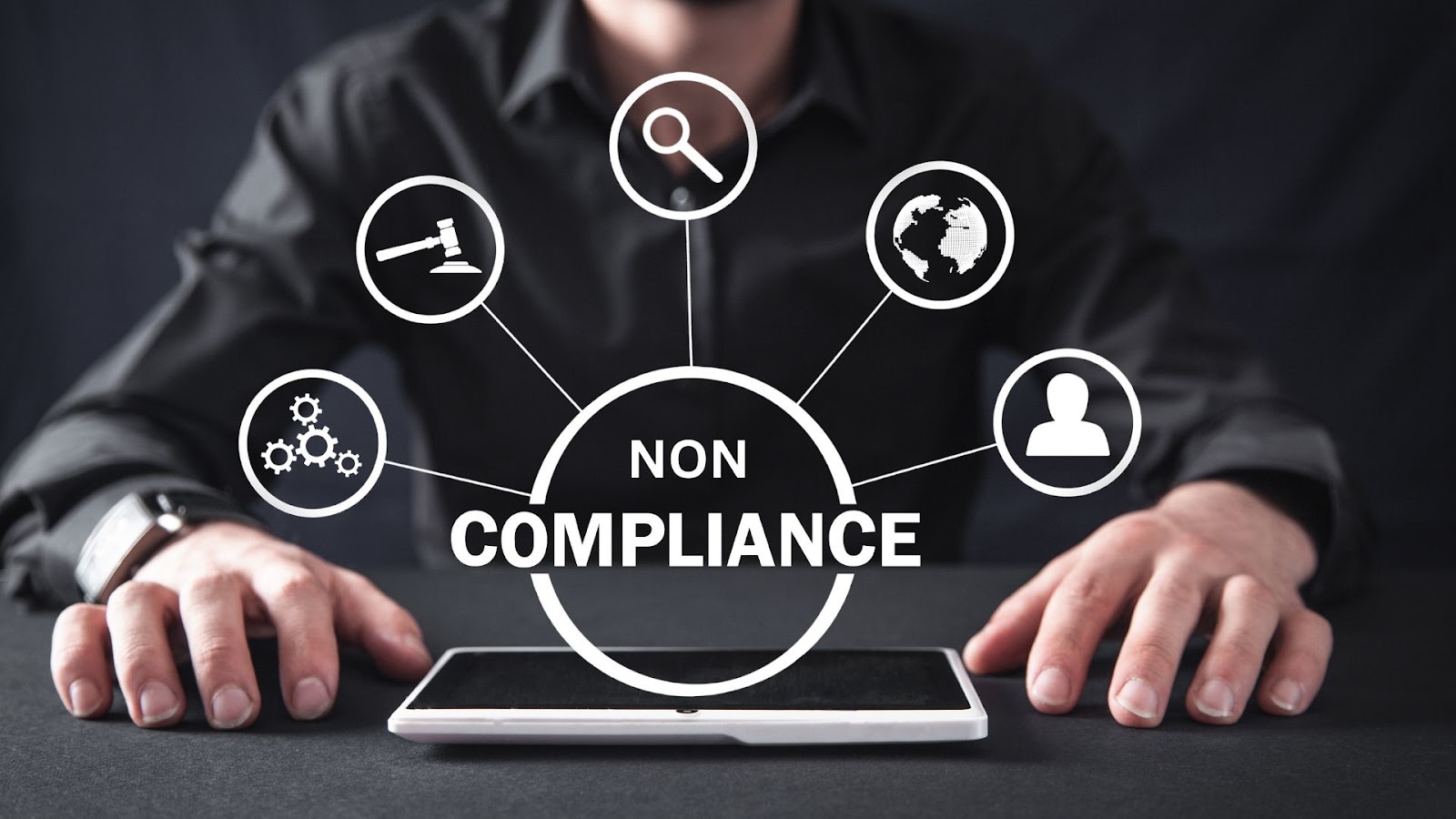
What if a single mistake could cost your business millions? Non-compliance is more than just a legal issue; it's a hidden risk that can hit when you least expect it. In 2025, the average fine imposed for non-compliance was an unbelievable 145.33 million US dollars.
From financial penalties to loss of reputation, the consequences of non-compliance can be severe. Whether it's failing to meet labour laws, data privacy standards, or environmental regulations, the stakes are high.
In this article, you'll learn the non-compliance meaning and how to protect your business from its damaging effects.
Non-compliance refers to the failure of a business to adhere to laws, regulations, or industry standards set by governing bodies or internal policies. This can range from missing out on safety protocols to neglecting tax obligations or violating labour laws.
While it may seem like a minor oversight, non-compliance can lead to significant financial and legal problems, disrupting your operations and reputation.
Now that you understand what non-compliance meaning, let’s explore the different types of non-compliance in business and how they can impact your operations.

Non-compliance can take on different forms, each carrying its own set of risks. Businesses often face non-compliance in various aspects, whether it's related to laws, ethical standards, or internal processes. Understanding these types helps identify potential vulnerabilities in your operations, ensuring that you can take proactive steps to mitigate risks.
Here are the key types of non-compliance your business might encounter:
Failing to adhere to industry regulations, such as the General Data Protection Regulation (GDPR) in the EU or OSHA safety standards in the U.S., can lead to hefty fines and operational disruptions. Businesses in healthcare, finance, and manufacturing face higher scrutiny in these areas.
Not complying with tax laws, employee rights regulations, or international trade laws, such as the Foreign Corrupt Practices Act (FCPA), exposes businesses to significant legal risks. For example, failing to properly classify workers can result in costly back wages and penalties.
Businesses ignoring corporate social responsibility (CSR) or ethical sourcing policies face reputation risks. For example, using suppliers that violate labor laws or engaging in misleading information can erode consumer trust and brand loyalty.
Companies may breach internal policies, such as not following proper inventory management systems or quality control procedures. Inconsistent adherence to standard operating procedures (SOPs) can lead to inefficiencies, safety risks, and customer dissatisfaction.
Not following financial reporting requirements or accounting standards like IFRS or GAAP can result in inaccurate financial statements. This can mislead investors, impact decision-making, and expose the business to scrutiny by regulatory bodies.
Having a clear understanding of these types can help you recognize where vulnerabilities lie within your business and guide you in taking appropriate corrective actions.
Now, let's explore the key areas where non-compliance is most common in business operations.

Non-compliance often occurs in specific areas of business, where regulations are strict and violations carry significant consequences. Identifying these areas helps businesses focus their resources on maintaining compliance and reducing risks.
Here are the most common areas where non-compliance happens:
For instance, many businesses in the U.S. have been penalized for misclassifying workers as independent contractors, which results in back pay and penalties.
Companies in construction or manufacturing often face fines and even temporary shutdowns for failing to meet safety protocols or for not providing adequate personal protective equipment (PPE).
For example, industries like manufacturing or energy face regulatory scrutiny for their carbon emissions or chemical discharges.
Next, let's look into the dangers of non-compliance and the serious consequences from overlooking these critical areas.

Non-compliance can lead to various consequences that severely impact your business. From legal penalties to long-lasting damage to your reputation, the risks are significant. These issues don't just affect finances; they can disrupt operations, break customer trust, and limit growth opportunities.
Here are the serious consequences of non-compliance:
Also Read: How to Manage and Avoid Common Compliance Violations During Debt Collection
These risks can significantly damage your business if not properly addressed. Next, let's explore how non-compliance affects your business reputation and why maintaining a good public image is essential.
Non-compliance can severely damage your company's reputation, leading to a loss of customer trust and loyalty. When businesses fail to meet regulations or ethical standards, customers often feel betrayed, which can result in negative reviews, public backlash, and long-term brand damage.
This tarnishing of your company's image makes it challenging to sustain clients or attract new ones, ultimately affecting your growth.
Example: When Volkswagen was caught in the emissions scandal, its reputation took a massive blow, leading to billions in fines and a significant loss of consumer trust.
Now that you understand how non-compliance can harm your reputation, let's explore the financial costs that come with it.
Non-compliance doesn't just affect your reputation, it also comes with heavy financial consequences. From direct costs like fines and penalties to indirect costs such as lost business opportunities, non-compliance can strain your finances in multiple ways. Regulatory fines can quickly add up, and the long-term financial burden of legal battles and settlements can be overwhelming for any business.
Example: In 2019, British Airways was fined $230 million for a data breach, highlighting the severe financial impact that non-compliance with data protection regulations can have.
Now that you have seen how non-compliance affects your finances, let's take a look at how it can impact your internal business culture and employee morale.
Non-compliance can have a profound effect on your company's internal culture, leading to decreased employee morale and productivity. When employees see that regulations and ethical standards are being ignored, it can create a toxic work environment.
This can result in a lack of trust in leadership, poor employee engagement, and even increased turnover as staff members seek more ethical and compliant organizations.
Example: In companies where whistleblowers expose unethical or illegal practices, such as in the Wells Fargo scandal, employee trust in leadership can erode, impacting overall productivity and staff retention.
Now, let's discuss strategies for preventing non-compliance and protecting your business from these risks.

Preventing non-compliance is not only about avoiding penalties, but also about protecting your business from financial loss, reputational damage, and internal disruption. By implementing proactive strategies and encouraging a culture of compliance, businesses can significantly reduce the risk of violations.
Here are some best practices to ensure your business remains compliant and operates smoothly.
Do you need help ensuring your business stays compliant? South East Client Services (SECS) specializes in compliance management and risk mitigation, offering personalized solutions to help businesses avoid legal pitfalls.
Call now to learn how SECS can protect your business against non-compliance risks.
Non-compliance can have serious repercussions, affecting everything from your company's reputation to its financial stability. The risks include hefty fines, legal battles, and damage to both your internal culture and external brand image. Understanding the non-compliance meaning and implementing effective strategies to prevent violations can safeguard your business against these potential threats.
SECS specializes in helping businesses manage compliance challenges, ensuring they stay on the right side of the law and avoid costly pitfalls. Their expert services provide customized solutions to mitigate non-compliance risks.
Contact SECS today to protect your business and maintain a strong, compliant foundation.
A. Common causes of non-compliance include lack of awareness of regulations, inadequate employee training, and failure to monitor changing laws. Businesses often overlook updates to regulations, leaving them vulnerable to violations.
A. Small businesses can prevent non-compliance by staying updated with industry regulations, providing regular training for employees, and setting up an internal compliance team. Regular audits also help identify potential gaps before they escalate.
A. If your business faces a non-compliance violation, it's important to address the issue immediately. Consult with legal experts, pay any fines, and implement corrective measures to prevent future violations and protect your reputation.
A. Non-compliance can create a toxic work environment, lowering employee trust in leadership. If employees witness unethical practices or disregard for laws, it leads to dissatisfaction, lower engagement, and higher turnover rates.
A. Yes, non-compliance can lead to lost business opportunities. Clients, investors, and partners are often unwilling to engage with companies that fail to meet legal or ethical standards, fearing reputational and financial risks.